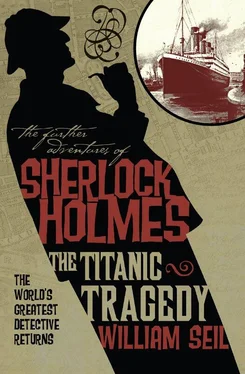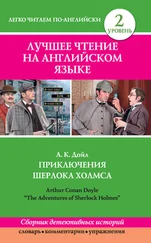‘Do you recall how long it was from the time you entered the hold until the shots were fired?’ asked Holmes.
‘I can only guess, but I’d say it was ten to fifteen minutes.’
‘And did you see who fired the shots?’
‘No, Mr Bishop had turned on the lights in the hold, but there were still areas of darkness. I only caught a glimpse of him.’
‘You are certain that it was a man?’
‘Yes, but I cannot provide any description beyond that... Tall, I believe... Doctoressed in a suit, not a crewman.’
‘When did you fire your gun?’ asked Holmes. ‘And why, Miss Storm-Fleming, were you carrying it?’
‘It is a habit I developed when I was living in New York. I seldom carry the Colt in England but, when I am travelling, I slip it into my bag. I suppose I am just apprehensive about travelling alone.’
‘Please continue.’
‘Well, when Mr Bishop was hit, I looked around and saw where the man was standing — about twenty-five or thirty feet away. He immediately ducked back into the shadows. After I had taken cover behind the Rolls, I remembered that I had the gun in my bag. I took it out and lifted my head just above the side of the door. I had to know whether he was still in hiding, or coming around after me. Just as I looked out, I saw him stepping forward, still in the shadows. But a ray of light did reflect off the gun. He was holding it directly in front of him. All I could think is that he was preparing to use it on me, and eliminate the possibility of a witness. I fired twice, and he leapt for cover. I was hiding behind the Rolls when I heard the sound of running. I looked up just in time to see him dashing through the door.’
‘Did you pursue him?’
‘Not immediately. I stopped to tend Mr Bishop but he was very clearly dead. As you know, Commodore, one shot hit him directly in the forehead... Anyway, I caught my breath and headed for the door. I am not sure whether I was looking to see that the killer was gone, or hoping to find help. As I stepped through the door, this big crewman ordered me to turn over my gun. I handed it to him, and then a moment later grabbed on to him and began to cry. When I regained my strength, I told him what had happened and took him inside to show him Mr Bishop’s body.’
Miss Storm-Fleming’s confident composure was weakening. It appeared that she was on the verge of tears. I wanted to step forward and comfort her but, wisely, resisted.
‘I told him what had happened, but I do not think he believed me. He held my gun to his nose, smelled that it had been fired, and told me that he was taking me to see the captain.’
Miss Storm-Fleming’s head was bowed, a single tear streaming down her cheek. She looked up at me asking, perhaps, what I thought of all this. In fact, I did not know what to think. Her story was generally plausible but why was she carrying a gun? And why, if she was accompanying Mr Bishop to the cargo hold, did she appear to be following him when I saw her from the squash-rackets court?
‘Captain,’ said Holmes, breaking a short spell of silence, ‘I suggest that some effort be made to locate the entry points of the two rounds fired by Miss Fleming.’
‘My thoughts, exactly, Commodore. Mr Murdoch, would you accompany Miss Storm-Fleming to the orlop deck and conduct a search. You can tend to weighing the bullets after that. Meanwhile, Miss Storm-Fleming, the evidence appears to be in your favour. You are at liberty to leave.’
‘Thank you, Captain.’
‘However, you are not completely beyond suspicion. Despite your claim of a man in the shadows, you were the only person found at the scene of the shooting. And while Bishop was not killed with your Colt, you still could have done the shooting with another handgun. If we find the second weapon hidden in the cargo hold, you could be back in custody again. And when we reach New York, I will turn the entire matter over to the authorities. They will, undoubtedly, want to question you further.’
‘I understand, Captain.’
‘And Miss Storm-Fleming, you will carry no more weapons on board this ship.’
‘Yes, sir.’
Murdoch, who had been standing by the door, indicated to her to follow him. As she walked by, I said softly, ‘I hope we will have an opportunity to talk later.’
She smiled and nodded, still holding back tears. A moment later, she and Murdoch were on their way to the cargo hold. Murdoch closed the door behind them.
‘Well, Mr Holmes, what do you think?’ asked the captain.
‘Her story is most curious, but as you said, the evidence is in her favour. There were no powder marks on Bishop’s body, which suggests that the gun was not fired at close range.’
‘What about this mysterious man in the shadows that Miss Storm-Fleming mentioned?’ asked Miss Norton. ‘Who do you suppose he is?’
‘When we find that out, we may be a step closer to finding our missing documents.’
The captain, who had been refilling his teacup, was taken aback by this remark.
‘Mr Holmes, are you suggesting that these two incidents are related?’
‘I think it is a strong possibility and our best lead yet in recovering the papers.’
‘Murder! Espionage! Mr Holmes, I have kept your little intrigue quiet so far. But now, I am afraid it is getting out of hand. We must inform Mr Ismay, the owner of the line, about the situation. I will ring him now to see if he is in his suite. If he is, I must ask the three of you to accompany me there.’
‘Very well,’ said Holmes. ‘My only request is that we do not go into any details about the nature of the stolen documents.’
‘On that you have my agreement.’
The captain picked up the telephone. I walked to the teapot to see if enough remained to pour three more cups.
‘Mr Ismay, please. Captain Smith here...’
Chapter Fourteen

THE EVENING OF FRIDAY 12 APRIL 1912
Our journey thus far had been one of unparalleled comfort and elegance. At least, that is what we thought. Hidden away on B Deck, we found the best and most luxurious accommodation the Titanic — or any other ship in the sea — had to offer.
Mr J Bruce Ismay occupied a suite of cabins on the port side. Combined, cabins B52, B54 and B56 formed a spacious ‘home away from home’. There was even a front porch — a private promenade overlooking the liner’s imposing hull.
At the time Captain Smith called over the ship’s telephone system, Mr Ismay was not in his cabin. His manservant, Mr Richard Fry, had answered, saying Mr Ismay was out having dinner but was expected back soon. He invited us to sit in Mr Ismay’s suite while awaiting his return.
I had lost track of time. So much had happened in the past few hours. When we left the captain’s cabin, we found that it was turning dark. Tired, I was invigorated by inhaling the fresh sea air. As we walked down to B Deck, I thought of Miss Storm-Fleming, walking with Murdoch in the ship’s enormous hold, attempting to locate the shots she had fired earlier in the day.
The captain’s knock on the door was answered by a slender, well-groomed man of medium height. He was dressed in a dark suit and tie.
‘Captain Smith, gentlemen, madam, would you come in, please?’
We passed into a magnificent sitting room. Not, mind you, the luxury you would find in a fine country house. But still, by far the best stateroom I had seen during my six decades on this earth.
‘Mr Fry, this is Commodore Giles Winter, Doctor John Watson and Miss Christine Norton. As I mentioned on the telephone, we have a matter of some delicacy to discuss with Mr Ismay.’
‘Yes, of course. Mr Ismay is due back shortly. May I get you something to drink while you are waiting?’ The captain nodded.
Читать дальше













